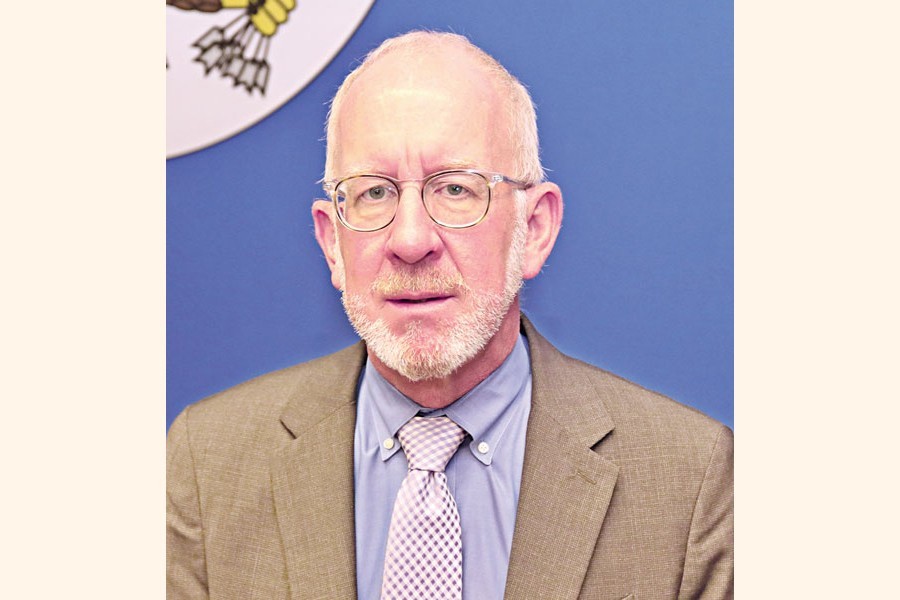Less-than-expected reform measures for ensuring labour rights hold back restoration of the Generalised System of Preferences (GSP) facility for Bangladesh by the United States, a top US trade official has said.
"Bangladesh has taken some initial steps to amend its labour laws, but workers here continue to be subjected to unfair labour practices. They face retaliation too often when they complain or attempt to organise collectively for change," said Assistant US Trade Representative (USTR) Christopher Wilson.
Mr Wilson arrived in Bangladesh Wednesday and had meetings with government officials of the ministries of ICT, agriculture, commerce, and foreign affairs as well as some business leaders. Data governance, technology, trade issues, and trade relationship, among others, came up for discussion during the meetings.
The main purpose of his visit was stated to be helping bolster bilateral trade relations between the US and Bangladesh. Dhaka has requested for long restoration of the suspended GSP facility on the country's single-largest apparel market in particular.
In an exclusive interview with The Financial Express, he said the government of Bangladesh indicated that additional labour-law amendments would take place soon.
"While the US GSP programme has currently expired and needs to be reauthorised by the US Congress, we do intend to remain constructively engaged on these issues," he said while replying to a query on possibility of restoration of the GSP facility for Bangladesh.
Mr Wilson noted that the inability to qualify for the GSP also prevented funding of development projects in Bangladesh by the US International Development Finance Corporation (DFC).
When his attention was drawn to the desired outcomes of the Trade and Investment Cooperation Framework Agreement (TICFA), which Bangladesh and the US signed back in November 2013, he said the pact had been a valuable mechanism for organising positive trade dialogues and exploring ways to reduce barriers and expand trade.
In 2013, the US suspended eligibility to receive benefits under the GSP citing lack of internationally recognised workers' rights in Bangladesh.
"The US is committed to supporting Bangladesh's labour-rights journey, including through targeted development assistance."
Mr Wilson mentioned that the US was Bangladesh's 'number-1' source of foreign direct investment (FDI) in 2021 with over US$585 million invested in one year. The US is also the largest historical source of FDI, with $4.3 billion total investment.
The US businesses play a significant role in the development of Bangladesh's economy - from energy and financial services sectors to emerging technologies and digital economy.
"There are several actions that Bangladesh can take to attract more investment. For instance, the US businesses want to see a transparent and predictable regulatory environment, and sound public procurement practices," he said, adding that these are some of the dos that can unlock more US investment here.
The US remains a rapidly growing destination for Bangladeshi ready-made garment (RMG) export. Trade in goods between the two countries reached over $10 billion in 2021, and the US is looking to continue raising bilateral trade with Bangladesh, he noted.
"Bangladesh is an attractive trade partner, because it has one of the fastest- growing economies in the world, a huge and growing middle-class population, and an eager and willing workforce."
Responding to a question as to whether the US has any plan to offer any tariff preference to Bangladesh after its graduation from the least-developed country (LDC) status, the senior USTR official said in the US tariff preferences are the purview of the Congress, and country-specific preferences are not currently being considered.
"I want to stress that the US is not going anywhere after Bangladesh graduates from the LDC status, and we will continue to work to increase bilateral trade and enhance economic growth.
"We already have the foundation to expand our economic relationship. The US is willing to go as fast as Bangladesh wants to go - in order to deepen our trade and investment relationship."
Asked whether the present US policy support would continue for boosting export of Bangladeshi RMG items to its market in future, Mr Wilson replied that the US is a top destination for Bangladeshi RMG export, but this is largely based on commercial demand.
"One of the Biden administration's top economic priorities is supply-chain diversification for a range of critical technologies, health and pharmaceutical products, and a range of other important items. There will certainly be a market in the US - to the extent Bangladesh can build up these industries."
On mandatory fumigation of the imported US cotton at Bangladeshi ports, he said the procedure is unnecessary because all the US cotton goes through multiple processes, including ginning and bale compression, which eliminate threat of harmful insects. Therefore, there is no threat of harmful pests arriving in Bangladesh through the US cotton.
"Removing the requirement to fumigate the US cotton in Bangladesh would significantly benefit both of our economies. This will help reduce costs and ensure a stable supply of high-quality US cotton for use in the local RMG industry. I am hopeful that this matter will be resolved soon," he adds.


